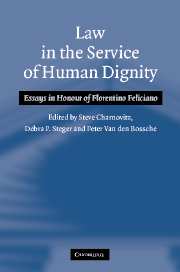Book contents
- Frontmatter
- Contents
- List of contributors
- Preface
- Biographical note
- List of abbreviations
- PART I Reflections on the contributions of Florentino Feliciano to international law
- PART II Insights into the World Trade Organization
- 5 Justice Feliciano and the WTO environmental cases: laying the foundations of a ‘constitutional jurisprudence’ with implications for developing countries
- 6 International trade law, human rights and theories of justice
- 7 Developing countries and the international trading system
- 8 North–South issues of foreign direct investments in the WTO: is there a middle-of-the-road approach?
- 9 The participation of developing countries in WTO dispute settlement and the role of the Advisory Centre on WTO Law
- 10 Reform of the WTO dispute settlement system: what to expect from the Doha Development Round?
- 11 Interpretation and Application of WTO Rules: Florentino Feliciano and the First Seven
- 12 Dispute settlement in the WTO: on the trail of a court
- 13 A proposal to introduce an Advocate General's position into WTO dispute settlement
- 14 Arbitration at the WTO: a terra incognita to be further explored
- 15 The challenges to the legitimacy of the WTO
- 16 The World Trade Organization after Cancún
- PART III The changing landscape of investment arbitration
- PART IV New challenges in international adjudication
- Bibliography of works by Florentino Feliciano
- Index
12 - Dispute settlement in the WTO: on the trail of a court
from PART II - Insights into the World Trade Organization
Published online by Cambridge University Press: 29 July 2009
- Frontmatter
- Contents
- List of contributors
- Preface
- Biographical note
- List of abbreviations
- PART I Reflections on the contributions of Florentino Feliciano to international law
- PART II Insights into the World Trade Organization
- 5 Justice Feliciano and the WTO environmental cases: laying the foundations of a ‘constitutional jurisprudence’ with implications for developing countries
- 6 International trade law, human rights and theories of justice
- 7 Developing countries and the international trading system
- 8 North–South issues of foreign direct investments in the WTO: is there a middle-of-the-road approach?
- 9 The participation of developing countries in WTO dispute settlement and the role of the Advisory Centre on WTO Law
- 10 Reform of the WTO dispute settlement system: what to expect from the Doha Development Round?
- 11 Interpretation and Application of WTO Rules: Florentino Feliciano and the First Seven
- 12 Dispute settlement in the WTO: on the trail of a court
- 13 A proposal to introduce an Advocate General's position into WTO dispute settlement
- 14 Arbitration at the WTO: a terra incognita to be further explored
- 15 The challenges to the legitimacy of the WTO
- 16 The World Trade Organization after Cancún
- PART III The changing landscape of investment arbitration
- PART IV New challenges in international adjudication
- Bibliography of works by Florentino Feliciano
- Index
Summary
Introduction
Is the dispute settlement mechanism of the World Trade Organization (WTO) a court? It is easy to imagine the first members of the Appellate Body asking themselves this question and contemplating their degree of latitude and discretion. International economic law is traditionally considered not to be amenable to the judicial settlement of disputes, and this might even be considered one of its distinguishing features. From this standpoint, the advent of a genuine court would indicate a process of evolution and indeed its consecration as ‘real’ law (expounded and sanctioned by a judge). It would also support and validate the thesis of rejection of the ‘clinical isolation’ of WTO law, particularly as the hypothesis of movement towards a judicial system is not specific to the settlement of trade disputes but applies to international law as a whole. Thus, there may be a sort of dialectic according to which the settlement of trade disputes is affected by this general trend insofar as it participates in and nourishes that trend. The approach is all the more tempting in that ‘judicialization’ has its own intrinsic value. Indeed, it is often viewed as a remedy for the traditional ailments or primitiveness of international law.
Although the dispute settlement mechanism may, in the course of only a few years, have developed a judicial structure and in so doing displayed a readiness to model itself on the jurisprudence of other international courts, especially in terms of procedure, various analysts prefer to use the convenient term ‘quasi-judicial’.
- Type
- Chapter
- Information
- Law in the Service of Human DignityEssays in Honour of Florentino Feliciano, pp. 136 - 158Publisher: Cambridge University PressPrint publication year: 2005

